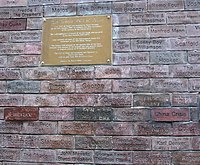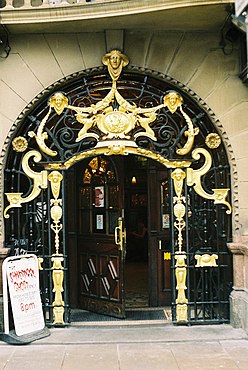4. Some pubs were really surprising
 |
| By Man vyi. Public domain |
Did Paco have any idea of the history of the Cavern Club?
Before visiting the famous Cavern Club pub, where the Beatles started to build up their fame, Paco wanted to read some information about it. He hadn't any idea where to begin, so he went to a local library and sat down for some time to read about the Beatles:
The Beatles made their first lunchtime appearance at the club on Tuesday 21 February 1961. They had returned to Liverpool from Hamburg, Germany, where they had been playing at the Indra and the Kaiserkeller. Their stage show had been through a lot of changes and some in the audience thought they were watching a German band. From 1961 to 1963 The Beatles made 292 appearances at the club, with their last occurring on 3 August 1963, a month after the band recorded "She Loves You" and just six months before the Beatles' first trip to the U.S. At the time, Brian Epstein promised the club's owners that the Beatles would return someday, but it was a promise that was never fulfilled.
(From Wikipedia)
Some = a little, a few or a small number or amount
Any = one, some or all
Usually, we use some in affirmative (+) sentences and any in negative (-) and interrogative (?) sentences:
I need some money for the party.
I don't need any special shoes to dance salsa.
Do you need any money for the party?
Was she watching any interesting programme on TV?
1) Paco is very busy visiting Liverpool. He doesn't have _____ time.
2) We need _____ wine and bread for lunch.
3) Stop watching TV and listen to _____ music.
4) Do you have _____ orange juice for the children? - Yes, I have _____.
5) Sonia went to town without _____ money.
6) Paco meets _____ friends at the weekend.
7) You don't have _____ pets at home. - No, I don't have _____.
8) Is there _____ milk in the fridge? - I'd like _____.
9) Put _____ butter in my sandwich, please.
10) I don't like _____ sugar in my coffee.
1. We didn't buy flowers for our mothers.
2. This evening I'm going out with friends of mine.
3. 'Have you seen good films recently?' - 'No, I haven't been to the cinema for ages'.
4. I didn't have money, so I had to borrow some.
5. Can I have
milk
in my coffee, please?
6. I was too tired to do
work.
7. You can cash these traveller's cheques at bank.*
8. Can you give me
information about places of interest in the
town? I'm sure you have.
9. If there are words you don't understand, use a dictionary.
10. Can you give me sugar, please?
* We use any in a positive sentence when the real sense is negative.
Nouns that can be countable and uncountable
Drinks like coffee, water, orange juice are usually uncountable. But if we are thinking of a cup or a glass, we can say in a restaurant or in a pub:
Two coffees and one tea please.
Liverpool is a great city for pubs and you will
not be lacking in choice if you are heading there for a pub crawl. The large
student population means that you can find cheap
 |
| By John Bradley. GNUE license |
By the way, a public house, informally known as a pub, is a drinking establishment licensed to serve alcoholic drinks for consumption on the premises in countries and regions of British influence. Although the terms often have different connotations, there is little definitive difference between pubs, bars, inns, taverns and lounges where alcohol is served commercially. A pub that offers lodging may be called an inn or (more recently) hotel in the UK. Today many pubs in the UK, Canada and Australia with the word "inn" or "hotel" in their name no longer offer accommodation, or in some cases have never done so. Some pubs bear the name of "hotel" because they are in countries where stringent anti-drinking laws were once in force. In Scotland until 1976, and in Wales until 2003, only hotels could serve alcohol on Sundays.
There are approximately 53,500 public houses in the United Kingdom. In many places, especially in villages, a pub can be the focal point of the community, so there is concern that more pubs are closing down than new ones opening.
The history of pubs can be traced back to Roman taverns, through the Saxon alehouse, to the development of the modern tied house system - a period of huge growth in the number of drinking establishments.
From Wikipedia.
About some and any with Spanish explanations.
Click here for a very good explanation of some and any and some examples.
Information about some and any, together with some useful links of extra information and activities.